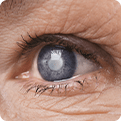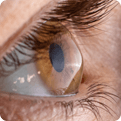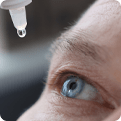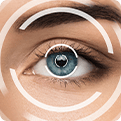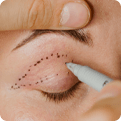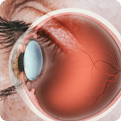
Dry eye syndrome occurs when your eyes can’t produce or maintain enough tears to offer adequate lubrication. While it won’t usually cause permanent loss of vision, finding an appropriate dry eye treatment is critical for your eye health and comfort.
Dry eyes are a familiar irritation for many people, with a painful, gritty and burning sensation causing much discomfort. Fortunately, taking preventive measures makes it possible to avoid the most serious complications caused by the condition.
Causes of Dry Eye
Dry eye syndrome can be triggered by many factors. The risk factor will be increased by the following causes.
Eyelid Issues
Blepharitis is an inflammation of the eyelid that may cause dry eyes. The condition is usually the result of a bacterial infection at the root of the eyelashes.
Aging
People over the age of 50 have a greater risk of dry eye caused by reduced tear production. The condition typically impacts women more than men, due to hormonal changes.
Contact Lenses
Hard contact lenses make it trickier for wearers to lubricate the eyes sufficiently. Oxygen flow to the eye leads to tear production, but harder lenses restrict access.
Medical Conditions
Sjögren’s syndrome is a disease that prevents fluid production around the body. One of the symptoms of this immune disorder is dry eyes.
Weather Conditions
Frequent exposure to harsh winds can lead to dry eyes. The same effect can also be produced from dry air produced by home heating systems.
Vitamin A Deficiency
Vitamin A from foods such as fish, eggs and carrots can support healthy eyes. If you are deficient in vitamin A, one of the various dry eye treatments could include an improved diet and vitamin supplements.
Treatment for Dry Eye Syndrome
After your eyes have been examined and the cause of the dry eye determined, it is possible to treat this condition. Some common dry eye treatments are as follows.
Lubricating Eye Drops
There are various eye drop solutions available, depending on the root cause of the dry eye issue. Ongoing use of lubrication will prevent your eyes from drying out.
Changing Contact Lenses
Changing to soft contact lenses will increase the oxygen supply to the eyes. These lenses allow your eyes to produce tears more easily.
Environmental Adjustments
Environmental factors can play a role in the health of your eyes. Avoid strong winds and smoke, use a humidifier to prevent dry air – and take regular breaks from the screen.
Treat the Inflammation
After diagnosis, your doctor may prescribe medication, eye drops, a warm compress, lid hygiene and other cornea treatments such as Lipiflow to reduce the inflammation causing dry eye syndrome.
Our Eye Care Specialists Are Here to Help
Eye Care of Delaware can assist with dry eye and a range of other eye care treatments and surgeries. If you are experiencing issues with your vision, contact us for an appointment online or call 302-454-8800 today.

